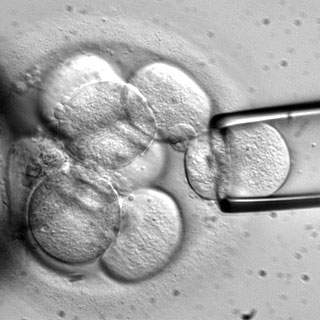Mouse Facility
List of Services
The mouse facility offers the following services:
- Hosting and handling of mice: import, hosting, reproduction and distribution of mice upon request
- Supply of mouse lines commonly used in biomedical research such as C57BL/6, CD1, C57BL/6xCBA F1, DBA, SJL, BALB/c, FVB/N, Rosa26R, CD1 Nude, NOD-SCID
- Import/rederivation of mouse lines by embryo transfer or Caesarean section and fostering
- Export of mouse lines by superovulation and embryo shipment
- Vasectomy of males to be used for pseudopregnancies
Transgenic Mouse Production
The transgenic mice are produced by microinjection of DNA directly into one of the pronuclei of the mouse zygotes. We commonly use F2 of C57BL/6 x CBA or C57BL/6 x DBA/2 as the donor embryos. The facility will superovulate donor mice, harvest single cell embryos and inject 250-300 embryos and transfer them to pseudopregnant females, typically in three injection sessions. Pups will be weaned, tailed and numbered by core personnel, and tails will be sent to the investigator for genotyping. A minimum of three transgenic founders is guaranteed per given construct or a minimum of 300 injected embryos are implanted and up to 30 pups are provided for genotyping. We cannot guarantee germline transmission or transgene expression. The purity of the DNA to be injected is one of the most essential factors affecting the successful outcome of pronuclear microinjections. We ask investigators to provide us with at least 10 µg of high purity DNA for injections and submit a picture of a gel showing the purified DNA along with a map indicating the restriction sites for the transgene and the size of insert.
We accept linearized DNA or circular BAC DNA for microinjection. We recommend investigators to follow the facility's protocols to purify their DNA fragments or BACs.
Gene Targeted Mouse Production
 Gene targeting services include DNA purification, electroporation into ES cells, colony isolation/expansion and blastocyst microinjection of the positive ES cells. The facility will electroporate the DNA and after culture under appropriate selection (G418) 192 clones are picked and grown in quadruplicate 96 well plates. Two plates are placed in short term storage at -80oC, and DNA is isolated from the other two plates. One DNA set is sent to the PI for screening, the other serves as a back-up. Correctly targeted clones are expanded and frozen in liquid nitrogen and stored until the whole procedure is finished. Additional DNA is prepared from these clones and is provided to the investigator to confirm the initial screening results. Correctly targeted clones are injected into blastocysts derived from C57BL/6 or C57BL/6xDBA/2 mice. A minimum of three chimeric pups of high percentage chimerism are guaranteed. Tails from chimera offspring will be provided to the investigator for screening. Investigators must provide us with plasmid DNA that derives from isogenic DNA homology arms. We accept linearized targeting vector DNA, purified and resuspended in sterile injection water in the amount of 50 µg. We ask investigators to submit a restriction map of the targeting vector and a picture of a gel showing the purified DNA.
Gene targeting services include DNA purification, electroporation into ES cells, colony isolation/expansion and blastocyst microinjection of the positive ES cells. The facility will electroporate the DNA and after culture under appropriate selection (G418) 192 clones are picked and grown in quadruplicate 96 well plates. Two plates are placed in short term storage at -80oC, and DNA is isolated from the other two plates. One DNA set is sent to the PI for screening, the other serves as a back-up. Correctly targeted clones are expanded and frozen in liquid nitrogen and stored until the whole procedure is finished. Additional DNA is prepared from these clones and is provided to the investigator to confirm the initial screening results. Correctly targeted clones are injected into blastocysts derived from C57BL/6 or C57BL/6xDBA/2 mice. A minimum of three chimeric pups of high percentage chimerism are guaranteed. Tails from chimera offspring will be provided to the investigator for screening. Investigators must provide us with plasmid DNA that derives from isogenic DNA homology arms. We accept linearized targeting vector DNA, purified and resuspended in sterile injection water in the amount of 50 µg. We ask investigators to submit a restriction map of the targeting vector and a picture of a gel showing the purified DNA.
For ES cell clones provided by PIs we will transfer up to 100 viable blastocysts per service fee. However we don't guarantee chimeras or germ line transmission in this case.
Genome Editing via CRISPR/Cas9 System
Design of CRISPR targets, synthesis and purification of RNA and DNA components is performed by the investigator. TMF requests that investigators provide high-purity CRISPR/Cas9 components.
- CRISPR/Cas9 Microinjections
Injection of CRISPR/Cas9 into mouse zygotes enables rapid generation of genetically altered mice. Mutant mouse models derived using CRISPR/Cas9 system bypasses the need for gene targeting in embryonic stem (ES) cells by directly manipulating the genome in mouse zygotes. Using this approach, the time for generating knockout, knockin, conditional, and targeted transgenic lines is substantially reduced.
- Zygote Electroporation of Nuclease
Mutant mice can be generated in one step using electroporation as a means to deliver the CRISPR/Cas9 components, including Cas9 mRNA, sgRNA, and donor oligonucleotide, into mouse zygotes.
Ad hoc services
Related services may include ES cell Cassette Deletion, expansion of ES cell clones provided by PIs, karyotyping and Mycoplasma Detection and is subject to additional charges.
ES Cell Cassette Deletion
Cre- or Flp-mediated excision of selection cassette from a single targeted ES clone, and 48 individual sub-clones will be selected. Purified DNA from each clone will be provided to the investigator's lab for analysis.
Karyotyping of clones
Chromosome spreads will be performed to confirm that the cells from targeted clone have a stable, normal karyotype of 40N XY.
Mycoplasma Detection
The transgenic facility will send all ES cell lines from outside of our facility for pathogen testing prior to blastocyst injections. The testing fee will be charged to the investigator.





0002.jpg)
